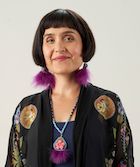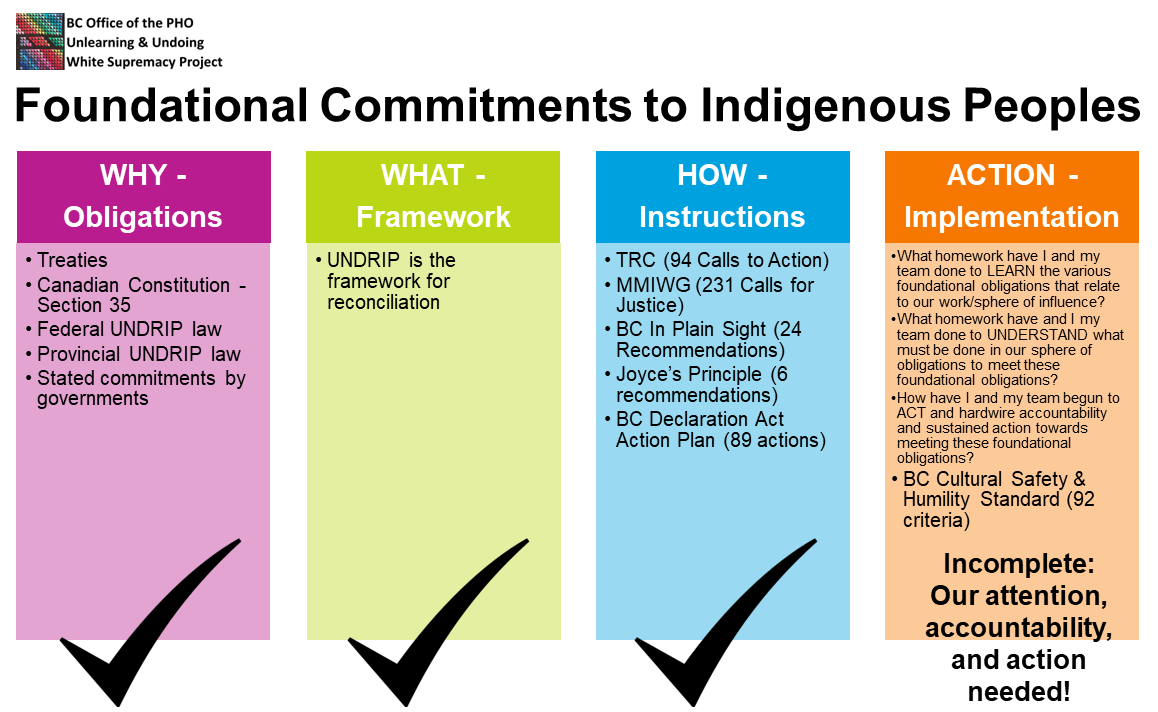Introduction to Unlearning & Undoing White Supremacy and Racism in the Office of the Provincial Health Officer
At the Office of the Provincial Health Officer (OPHO), we are committed to upholding the inherent rights of Indigenous Peoples (First Nations, Métis, and Inuit) in BC, as well as anti-racist approaches, and truth and reconciliation. We are committed to seeing the ways that anti-Indigenous racism and white supremacy show up in our day-to-day work (i.e., policies, practices, processes), and deliberately taking anti-racist approaches to arrest white supremacy and racism. We are also beginning work to pay particular attention to the rights and needs of Indigenous elders, women, 2SLGBTQIA+, youth, children and persons with disabilities throughout this work.
The Unlearning and Undoing White Supremacy Project began a two-year initiative that has transitioned to ongoing efforts to embed Indigenous rights, truth, and reconciliation across the OPHO.
Land Acknowledgement
We acknowledge with great respect the territories of the lək̓ʷəŋən peoples which the Office of the Provincial Health Officer stands, and the Songhees, Esquimalt (Xwsepsum) and W̱SÁNEĆ peoples whose historical relationships with the land continue to this day. We recognize and express our gratitude for the medicines within these territories, and the First Nations territories that stretch across every inch of the province of British Columbia.
Rights Acknowledgement
We acknowledge with respect the inherent rights of the First Nations whose ancestral territories cover every inch of the province now known as British Columbia, including their unextinguished land rights and rights to self-determination, health, and wellness within these territories. Laws and governance systems rooted in the land have upheld the sovereignty of these diverse Nations for thousands of years. The rights and responsibilities of First Nations to their ancestral territories have never been ceded or surrendered, and are upheld in provincial, national, and international law.
We also recognize that many Indigenous Peoples (First Nations, Métis, and Inuit) from elsewhere in what is now known as Canada and beyond also call these lands and waters home, and they too have inherent Indigenous rights to self-determination, health, and wellness. This includes Métis Nation British Columbia and its Chartered Communities across BC, as well as those whose ancestral territories are outside of BC.
Introducing Ourselves
 Bonnie Henry, MD, MPH, FRCPC
Bonnie Henry, MD, MPH, FRCPC
I am a 5th generation Canadian settler of Scottish Highland and Welsh ancestry, born and raised on Mi’kmaq territory (PEI/NB). I acknowledge with gratitude that I live, work, and play on lək̓ʷəŋən territory (Songhees and Esquimalt Nations). I have the privilege of working as BC’s Provincial Health Officer. Our office is learning how to better honour Indigenous Peoples and ways of knowing in our work. We have committed to disrupting anti-Indigenous racism in the health-care system with the guidance of First Nations, Métis, and Inuit teachers.
 Danièle Behn Smith, MD, CCFP, MPH (she/her)
Danièle Behn Smith, MD, CCFP, MPH (she/her)
Taanshi, Dágǫndı́h, Greetings with gratitude on the territories of the lək̓ʷəŋən (Lekwungen) peoples of the Songhees and Esquimalt Nations! I’m Métis from the Red River Valley and Eh Cho Dene from Fort Nelson First Nation. I am a mama to two beautiful kids and one little black dog. I have the honour and privilege of working as the Deputy Provincial Health Officer, Indigenous Health. At the BC OPHO, we are working towards an environment of cultural safety, anti-racism, and trustworthiness. Mussi cho/Maarsi.

Kate Jongbloed, PhD (she/her)
I am a white occupier living on the territories of the xʷməθkwəy̓əm (Musqueam), Sḵwx̱wú7mesh Úxwumixw (Squamish), and Səl̓ílwətaɬ (Tsleil-Waututh) Nations. I am an epidemiologist and mixed methods health researcher with 12+ years of experience working in the field of Indigenous health and wellness. I am lucky to be working with Danièle and the OPHO team during a two-year CIHR Health Systems Impact Post-Doctoral Fellowship (2021-2023).
We recognize with tremendous gratitude the other staff, leaders, and trainees within the OPHO who contribute their hands, hearts, and minds to this work.
OPHO Vision on Indigenous Rights, Truth, and Reconciliation
We envision an OPHO that:
- Recognizes the inherent rights and title of BC First Nations and the inherent rights of all First Nations, Métis, and Inuit living in BC.
- Acknowledges that these rights can only be fully exercised when the ecosystems in which they are embedded are vibrant, biodiverse, and loved and cared for, and that we therefore share a collective responsibility to the health and wellness of these territories.
- Recognizes the truth that Indigenous-specific racism is perpetuated through white supremacist policies and practices that remain hardwired into our systems and processes, and that impede the health and wellness of Indigenous Peoples.
- Actively works to uphold the inherent rights of Indigenous Peoples by taking action on specific Foundational Commitments made to Indigenous Peoples (e.g., United Nations Declaration on the Rights of Indigenous Peoples, the Truth and Reconciliation Commission Calls to Action, the National Inquiry into Missing and Murdered Indigenous Women and Girls, and the In Plain Sight report), being trustworthy in relationships with Indigenous partners, and taking anti-racist actions in all aspects of OPHO work.

WHY are we doing this work?
Our obligation to uphold inherent Indigenous rights, anti-racist approaches, and truth and reconciliation is articulated in provincial, federal, and international laws and initiatives:
- Treaties
- Canadian Constitution – section 35
- Federal UNDRIP law
- Provincial UNDRIP law
- Stated commitments by governments
WHAT framework guides our reconciliation work?
The United Nations Declaration on the Rights of Indigenous Peoples (UNDRIP) has been established as the province’s guide for reconciliation with the BC Declaration on the Rights of Indigenous Peoples Act. Principles for reconciliation are provided within the 10 Draft Principles that Guide the Province’s Relationship with Indigenous Peoples.
HOW will we meet our obligations?
The solutions have been provided. Indigenous Peoples have provided nearly 1000 clear and detailed instructions on how to uphold inherent rights, anti-racist approaches, and truth and reconciliation in the following foundational documents:
- Royal Commission on Aboriginal Peoples (RCAP) (440 Recommendations)
- Truth and Reconciliation Commission TRC (94 Calls to Action)
- National Inquiry into Missing and Murdered Indigenous Women and Girls (MMIWG) (231 Calls for Justice)
- 2SLGBTQQIA+ Sub-Working Group - MMIWG2SLGBTQQIA+ National Action Plan
- BC In Plain Sight (24 recommendations)
- BC Declaration on the Rights of Indigenous Peoples Act Action plan (89 actions)
- BC Cultural Safety & Humility Standard for Health Organizations (91 Criteria)
ACTION: So, what do we do?
We have a responsibility to act on the instructions provided by Indigenous Peoples within the foundational commitments. Despite having clear obligations and frameworks, our accountabilities and actions are incomplete. We must ask ourselves:
- LEARN: What homework have I (and my team) done to LEARN from the original inhabitants of these lands and waters about their laws and teachings, as well as the truths of settler colonial harms and how they continue to manifest in the present day?
- UNDERSTAND: What homework have I (and my team) done to UNDERSTAND what must be done in our sphere of obligations to meet these foundational obligations?
- ACT: How have I (and my team) begun to ACT in ways that challenge, elevate and advance true reconciliation, including hardwiring accountability and marathon actions towards meeting these foundational obligations?
